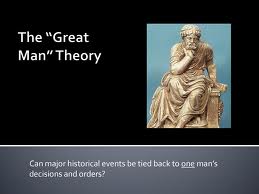Scientific study of leadership
Heilbrunn (1994, p.65) divides scientific study of leadership into three phases:
1. 1900 – World War II. Researchers attempt to identify traits of leaders in order to study charisma.
2. World War II – 1970s. Main focus of leadership researches are behaviour of leaders.
3. 1970’s – present (date of publication). Interaction between leaders and followers are being studied.
Focusing on the traits associated with great leaders, Frank (1993, p.382) informs that earliest studies of leadership had theoretical underpinning which stated that leaders are born, not bred and this research prevailed throughout the first half of the 20th century.
Woods (2005, p.1103) informs that early approaches to the topic of leadership highlighted personality traits of key people as critical, which serves as a basis for The Great Man Theory. The Theory advocates the notion of ‘born leaders’, insisting that great leaders possess special skills, intelligence, trait and characteristics, which allow them to take competent decisions and lead the rest of the crowd, whatever a situation or environment might be.
However, Adair (2007) informs that “Great Man Theory” has been found invalid in 21st century as nowadays, the majority of business researchers and practitioners believe that anyone can learn leadership skills and abilities with the presence of sufficient level of motivation.
Parks (2005, p.4) informs that traditional understandings of leadership up to now have focused on personality characteristics, situation analysis and transaction of power and influence, but brands the notion of born leaders as inadequate, claiming that, at present, growing consensus among leadership theorists justify her stand.
Various authors have offered their opinions regarding the fundamental essence of leadership. For instance, it has been stated that “fundamental core of global leadership consists of self-awareness, engagement in personal transformation, and inquisitiveness” (Mendenhall, 2008, p.54)
References
- Adair, J, 2007, Effective Leadership Development, Chartered Institute of Personnel and Development.
- Heilbrunn, J, 1994, ‘Can Leadership Be Studied?’, Wilson Quarterly, vol.18, p.p.65-68
- Frank, MS, 1993, ‘The Essence of Leadership’, Public Personnel Management, vol.22, p.382
- Mendenhall, ME, 2008, Global Leadership: Research, Practice, and Development,
- Parks, SD, 2005, Leadership Can Be Taught. A Bold Approach for a Complex World, Harvard Business School Press, Boston Massachusetts
- Wood, M, 2005, ‘The Fallacy of Misplaced Leadership’, Journal of Management Studies, vol.42 pp.1101-1121

